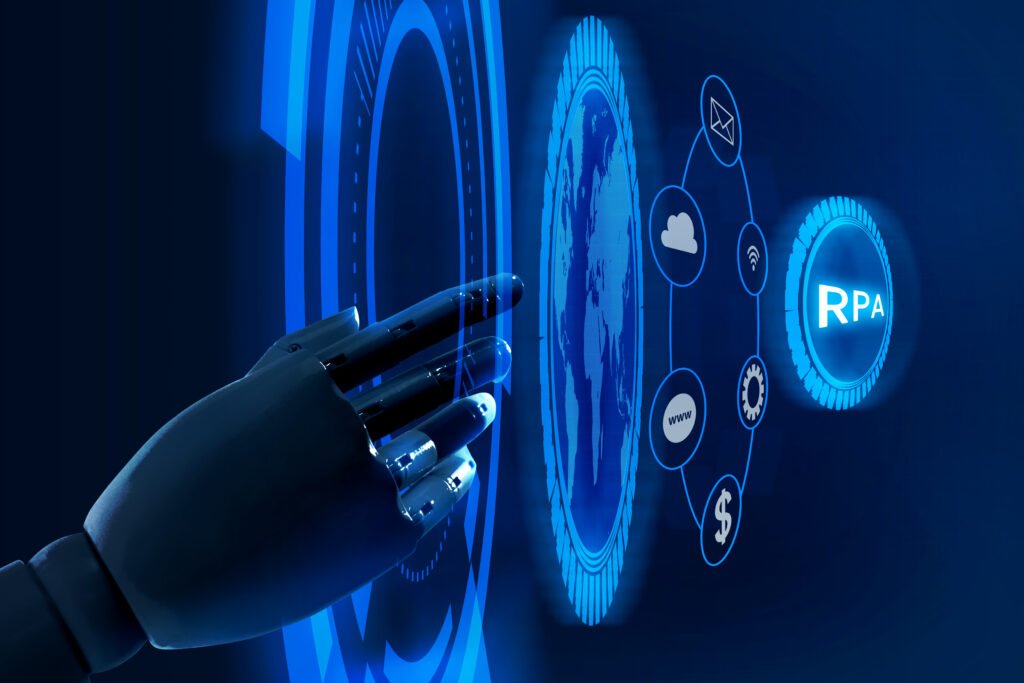As I look at the endless data on my screen, I think about how things were different a decade ago. Artificial intelligence (AI) has changed business operations in big ways. It has made managing information much easier.AI has changed how we make decisions and connect with customers. It automates tasks and finds insights in big data. This has made a huge difference in business.
In this article, we’ll look at how AI is changing business management. We’ll share real examples and insights. This will help you see how AI can help your business, whether you’re an executive or starting out.
Introduction to AI’s Transformative Potential
Artificial Intelligence (AI) is changing the business world. It promises to make companies work better and compete more effectively. AI technologies like machine learning and natural language processing help businesses be more efficient and make better decisions.AI is making tasks easier by automating them. This lets companies focus on important tasks. It also cuts down on mistakes, saving money and improving how things get done.
AI also changes how companies make decisions. Predictive analytics, powered by AI, helps predict market trends and improve customer experiences. This new way of making decisions is changing many industries, from finance to retail. It helps businesses stay ahead.
| Key AI Capabilities | Business Applications |
|---|---|
| Machine Learning | Predictive analytics, customer segmentation, fraud detection |
| Natural Language Processing | Chatbots, sentiment analysis, language translation |
| Computer Vision | Image recognition, quality control, autonomous vehicles |
As more businesses use AI, the changes will be huge. AI will help companies work better and make smarter choices. It’s set to change how businesses compete and succeed in the digital world.
How AI Streamlines Business Processes
AI is changing how businesses work, making things more well organized. It automates tasks and analyzes data better than humans. This helps companies run smoother and faster.
Automating Repetitive Tasks
AI is great at doing the boring stuff. It handles tasks like data entry and customer service. This lets people do more necessary work.
It also makes fewer mistakes than humans. This means better productivity and fewer errors.
Enhancing Data Analysis
AI also makes data analysis better. It looks through lots of data to find important insights. This helps businesses make smarter choices.From predictive analytics to better customer service, AI is making a big difference. It’s changing finance and other industries for the better.
“AI is transforming the way businesses operate, enabling them to streamline processes, boost efficiency, and make more informed decisions.”
As AI becomes more common, companies that use it will lead the way. AI’s impact on business strategy and operations is clear. The future looks bright for those who embrace AI.
The Impact of AI on Business Strategy

Businesses today face a fast-changing market. Artificial intelligence (AI) is making a big difference in how they plan for the future. AI helps them understand trends and make smart decisions quickly.
AI can look at huge amounts of data and find insights humans might miss. This lets companies spot new chances, guess what customers want, and make better choices. This way, they can stay ahead of their rivals.
| AI Capabilities | Strategic Impact |
|---|---|
| Predictive analytics | Identifying emerging market trends and opportunities |
| Personalized customer insights | Tailoring products and services to customer preferences |
| Process optimization | Improving operational efficiency and reducing costs |
AI also helps businesses be quick to react to changes in the market. By using AI and human knowledge together, companies can make choices based on solid data. This helps them succeed in a tough business world.
“AI is not just a technology, but a strategic enabler that is reshaping the way businesses operate and compete.”
As AI’s role in business strategy grows, smart companies are using it to get ahead. They’re preparing for a bright future by embracing this powerful technology.
AI-Driven Decision Making
Artificial intelligence (AI) is changing how businesses make decisions. It helps companies analyze data, predict trends, and tailor customer experiences. This leads to smarter, data-driven choices.
Predictive Analytics
AI’s predictive data is a big deal for businesses. It uses advanced algorithms to forecast what customers will do and what trends will come next. This lets leaders make decisions based on solid data, helping them plan better and avoid problems.
Personalized Customer Experiences
Today, businesses need to offer unique experiences to stand out. AI makes this possible by analyzing what each customer likes and needs. This way, companies can give customers exactly what they want, building loyalty and growing their business.
| Metric | Impact of AI on Business Operations |
|---|---|
| Decision-Making Accuracy | Improved by up to 20% |
| Personalization of Customer Experiences | Increased customer satisfaction by 15% |
| Predictive data Capabilities | Improved forecasting accuracy by 30% |
As AI keeps changing business strategy and operations, companies that use it will get ahead. They’ll have a big edge over their competitors in the future.
The Impact of AI on Business Operations
Artificial intelligence (AI) has changed how businesses work in many fields. It brings automation, optimization, and real-time insights. This helps companies work better, save money, and improve overall performance.
AI is making a big difference by automating routine tasks. It uses AI algorithms to handle many administrative jobs. This lets employees do more important work, making them more productive and reducing mistakes.
AI also changes how companies make decisions. It uses predictive analytics to give insights into customer behavior and market trends. This helps businesses make better choices, save money, and grow profits.
In supply chain management, AI is key. It helps manage inventory, improve logistics, and schedule transportation. AI analyzes data to find patterns and predict demand. This makes supply chains more efficient and cuts down on waste.
AI is also changing customer service. Chatbots and virtual assistants offer 24/7 support. They give personalized help, making customers happier and freeing up human staff for tougher issues.
As AI’s role in business grows, companies that use it will lead the way. They will excel in operations, stay competitive, and achieve lasting success.
AI and Supply Chain Management
AI has a big impact on business, especially in supply chain management. It’s changing how we manage inventory and logistics. This leads to better efficiency, less waste, and happier customers.
Inventory Optimization
AI systems can handle lots of data to improve inventory management. They look at past sales, market trends, and current stock levels. This helps predict demand and automate restocking, avoiding stockouts and saving money.
Logistics Automation
AI is also changing logistics in supply chain management. It uses machine learning for tasks like planning routes, managing fleets, and tracking shipments. This makes operations smoother and improves customer contentment with faster and more reliable deliveries.
| AI Application | Impact on Supply Chain |
|---|---|
| Inventory Optimization | Reduced stockouts, minimized excess inventory, and improved cost-efficiency |
| Logistics Automation | Streamlined operations, enhanced customer experience, and increased visibility |
Many top companies are using AI to change their supply chain management. They use AI insights and automation to stay ahead and serve their customers better.
“AI is transforming the way we approach supply chain management, enabling us to make more informed decisions, optimize our processes, and deliver a superior customer experience.”
As AI’s role in business grows, its importance in supply chain management will too. It will be key for success in the future.
AI-Powered Customer Service
In today’s digital world, artificial intelligence (AI) is changing how businesses serve customers. AI helps companies offer more personalized and efficient service. This leads to right customers and more loyalty.
Intelligent chatbots and virtual assistants are key in this change. They handle many customer questions, like tracking orders or solving problems. This lets human agents deal with harder issues, making service better and faster.
AI-driven predictive analytics also plays a big role. It helps guess what customers might need next. By looking at data, AI finds patterns to offer better, more tailored solutions. This makes customers happier and helps businesses grow and adapt.
| AI-Powered Customer Service Features | Benefits |
|---|---|
| Intelligent Chatbots and Virtual Assistants | Improved efficiency, 24/7 availability, and personalized support |
| AI-Driven Predictive Analytics | Anticipation of customer needs, personalized solutions, and proactive problem-solving |
| Automated Routine Tasks | Freeing up customer service agents for more complex issues and enhancing overall responsiveness |
By using AI for customer service, businesses can work better and smarter. As AI gets better, its impact on serving customers will only grow stronger.
AI’s Role in Cybersecurity
AI is changing how businesses work and protect themselves. It’s making threat detection and vulnerability monitoring better. These tools help keep important data and assets safe from cyber threats.
AI can look through lots of security data fast. It finds patterns and oddities that show threats. This means businesses can act quickly when they find a problem. A study showed AI cut down the time to fix security issues by over 30%.
AI is also changing how we find and fix weaknesses in systems. It scans networks and apps all the time. This way, it finds problems before hackers can use them. This helps businesses focus on fixing the most important security issues.
AI is getting more important for keeping businesses safe. It helps them stay in front of cyber threats. This way, they can protect their data and keep their operations running well.

Challenges and Ethical Considerations
As AI’s impact on business operations grows, companies face many challenges and ethical issues. One big concern is data privacy. It’s vital to handle sensitive information responsibly to keep trust and follow the law.
Another major issue is algorithmic bias. AI can sometimes show biases from society. Businesses need to check their AI for fairness and make sure decisions are fair for everyone.
- Job loss is a big worry as AI automates more tasks. Companies should help workers learn new skills to keep up with changes.
- It’s crucial to develop and use AI ethically. Businesses should have clear rules and values to guide AI use.
Dealing with these challenges is key for companies to use AI well. By focusing on privacy, avoiding bias, supporting workers, and using AI responsibly, businesses can benefit from AI while staying ethical.
| Challenge | Potential Impact | Mitigation Strategies |
|---|---|---|
| Data Privacy | Breach of customer/employee trust, legal and regulatory issues | Robust data governance, transparent data policies, user consent management |
| Algorithmic Bias | Unfair and discriminatory decision-making, reputational damage | Bias testing, diverse data sets, algorithmic auditing, inclusive design |
| Job Displacement | Employee anxiety, workforce disruption, social impact | Reskilling and upskilling programs, job transition assistance, proactive workforce planning |
| Ethical AI Development | Misuse of AI, erosion of public trust, negative societal consequences | Ethical AI frameworks, governance structures, human oversight, transparency in AI systems |
Conclusion
The role of artificial intelligence (AI) in today’s business world is huge. This article shows how AI can change how companies plan, make decisions, and run their daily activities. AI can automate tasks, improve data analysis, and make customer experiences better. It also helps keep businesses safe from cyber threats.
AI makes business processes smoother, improves supply chain management, and helps make decisions based on data. As AI’s role in business grows, companies that use it will do well. But, they must also think about the challenges and ethics of using AI.
Using AI in business is not just a trend; it’s a must for staying ahead. It helps companies work better, serve customers better, and find new ways to grow. AI is key to changing how businesses operate and succeed in the digital world.
FAQ
How can AI improve business operations?
AI can make business operations better in many ways. It automates tasks, improves data analysis, and helps make better decisions. By automating and analyzing data, businesses can work more efficiently, save money, and make smarter choices.
What is the impact of AI on business strategy?
AI greatly affects business strategy by offering deep insights and predictive tools. These tools help businesses make strategic decisions. They can adapt quickly to market changes and trends, giving them an edge over competitors.
How can AI be used in supply chain management?
AI changes supply chain management by optimizing inventory, automating logistics, and providing real-time insights. AI solutions improve supply chain efficiency, cut waste, and boost customer satisfaction.
What is the role of AI in customer service?
AI is changing customer service by making it more personalized and efficient. AI chatbots and virtual assistants offer better customer experiences. This leads to right customers and increased loyalty.
How can AI improve cybersecurity?
AI is key in improving cybersecurity by better detecting threats and monitoring vulnerabilities. AI solutions help businesses quickly spot and handle security issues. This protects important data and assets.
What are the challenges and ethical considerations of using AI in business?
Using AI in business comes with challenges and ethical issues. These include data privacy, bias in algorithms, and job loss. It’s important to address these concerns and use AI responsibly for its ethical use in business.vvv

